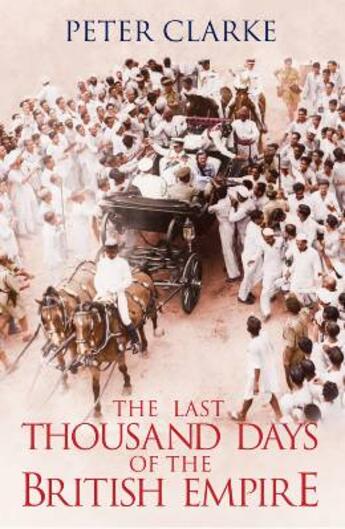-
Date de parution : 09/02/2008
-
Editeur :
Viking Adult
-
EAN : 9780713998306
-
Série :
(-)
-
Support :
Papier
Résumé:
Winston Churchill's famous statement in the House of Commons in November 1942, just as the tide of the Second World War was beginning to turn, pugnaciously proclaimed his loyalty to the world-wide institution which he had served devotedly for most of his life. The majority of the British people,... Voir plus
Winston Churchill's famous statement in the House of Commons in November 1942, just as the tide of the Second World War was beginning to turn, pugnaciously proclaimed his loyalty to the world-wide institution which he had served devotedly for most of his life. The majority of the British people, who believed they were fighting the war to beat the Germans and preserve the Empire, shared his view. Yet less than five years after Churchill's trenchant speech, and despite - apparently - winning the war, the British Empire effectively ended with Indian Independence in August 1947 and the end of the British Mandate in Palestine in May 1948. How did this rapid change of fortune come aboutoe In January 1945, just before the conference at Yalta between Churchill, Stalin and Truman, where the disposition of so much of the post-war world was made, Lord Wavell, the Viceroy of India wrote in his diary: 'I wonder if the Prime Minister, who is the biggest man of the three, will still be able to assert his dominant personality. A great triumph if he can, the oldest man of the three, with the weakest hand to play.' Peter Clarke's book is the first to analyse in detail the losing hand which Britain was dealt in the last year of the war, and then to see how that hand was played over the next two years by Churchill's successors. The book's originality lies in the detailed narrative which shows how military, political and economic developments bore down upon each other. It makes superb use of the copious letters and diaries now available of the major participants and many involved observers to show how decisions were taken, and of contemporary newspaper reports and contemporary witnesses to show how those decisions were received: it recreates both the geopolitics and the atmosphere of the period. Not least, it analyses dispassionately the role of the USA: how Roosevelt and his successors were determined that Britain must be sustained both during the war and after, but that the British Empire must not; and how the tension between Allied war aims, suppressed while the fighting was going on, became rapidly apparent when it stopped. The book thus also describes the short pivotal period when American influence finally took over from the British in world politics.
Donner votre avis















